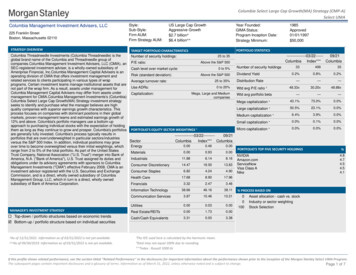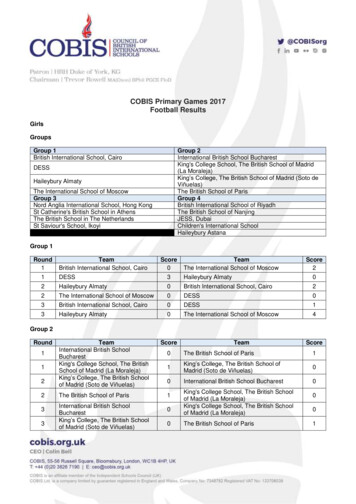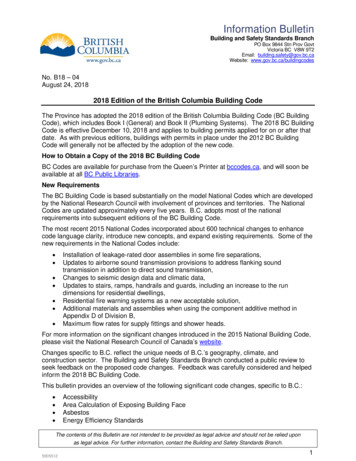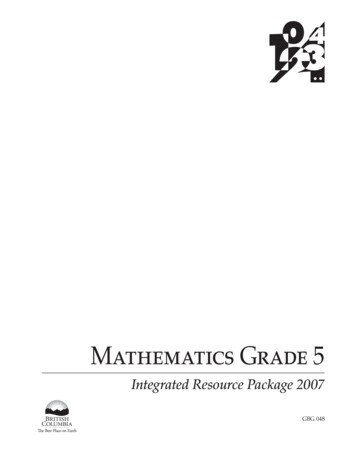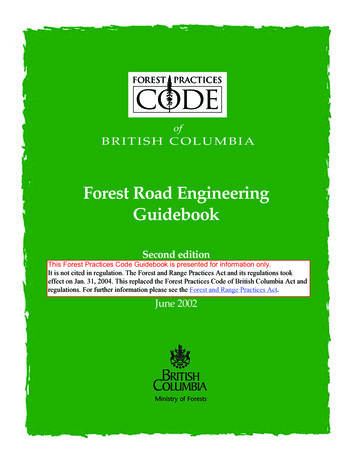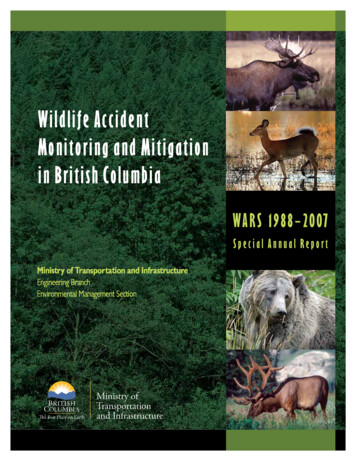
Transcription
LAW SOCIETY OF BRITISH COLUMBIAPRACTICE CHECKLISTS MANUALINCORPORATION—BUSINESS CORPORATIONS ACTPROCEDURELEGEND — NA Not applicable L Lawyer LA Legal assistantACTION TO BE CONSIDEREDNALLADATEDUEDATEDONEINTRODUCTIONPurpose and currency of checklist. This checklist is designed to be used with theCLIENT IDENTIFICATION, VERIFICATION, AND SOURCE OF MONEY (A-1) checklist andCLIENT FILE OPENING AND CLOSING (A-2) checklist. It is intended for use as a guideto incorporation of companies under the British Columbia Business CorporationsAct, S.B.C. 2002, c. 57 (the “BCA”). The checklist is current to September 1, 2021.New developments: COVID-19 pandemic. The COVID-19 pandemic continues to have significantimpacts on business: inability to attend, or aversion to, in-person meetings; possible delays at government agencies and public registries; border closures;unpredictable economic circumstances, etc. Counsel should keep apprised of developments related to COVID-19 (and response measures) that may affect theirclients’ businesses or transactions. Note that:o The Land Title Survey Authority has implemented temporary practice changes that remain effective until further notice. The mainchanges involve remote witnessing procedures and acceptance oftrue copies instead of originals. For further information see:ltsa.ca/covid-19-resources/.o Counsel conducting due diligence searches will need to be mindfulof the impact of the COVID-19 pandemic. Response times forsearch requests may be delayed and, accordingly, such delaysshould be accounted for in the due diligence timeline. Counselshould be aware that search results may not disclose certain actions, fines, levies, or administrative penalties which have beendelayed but are otherwise permitted to be filed or issued beyondthe typical limitation period.DM341481212/21B-5-1
INCORPORATION—BUSINESS CORPORATIONS ACTPROCEDURELAW SOCIETY OF BRITISH COLUMBIAPRACTICE CHECKLISTS MANUALLEGEND — NA Not applicable L Lawyer LA Legal assistantACTION TO BE CONSIDERED Electronic Meetings. On May 20, 2021, the majority of the provisions of theFinance Statutes Amendment Act (No. 2), 2021, S.B.C. 2021, c. 14 came intoeffect by Royal Assent. The Act amends the BCA as well as the CooperativeAssociation Act, S.B.C. 1999, c. 28; Financial Institutions Act, R.S.B.C. 1996,c. 141; and Societies Act, S.B.C. 2015, c. 18 to expressly permit virtual AGMsand board meetings. The legislation now provides that, unless the memorandumor articles provide otherwise, a company may hold its AGM by telephone orother communications medium if all shareholders and proxy holders attendingthe meeting are “able to participate in it”. This replaces the previous requirementthat shareholders and proxy holders be “able to communicate with each other”.The rules further provide that if a company holds a meeting of shareholders thatis an electronic meeting, the company must “permit and facilitate participationin the meeting”. Companies should consider whether they may want to requirein-person meetings (which will now require an explicit restriction on holding anAGM by telephone or other communications medium in the company’s articles). Revocability of a shotgun offer. In Blackmore Management Inc. v. CarmanahManagement Corp., 2021 BCSC 1379, the court applied the principles of contractual interpretation to a shotgun clause in a shareholders’ agreement. Thecourt held that an offer made under a shotgun clause will not be irrevocable inthe absence of express language in the agreement to the contrary. Revocabilityis an important consideration in the drafting of shotgun clauses. These clausesare typically included in shareholders’ agreements to provide the parties with adispute resolution mechanism that will result in one shareholder selling its sharesto the other shareholder at a price that is determined under a construct that promotes fairness. This is achieved by the triggering party making twoNALLADATEDUEDATEDONEoffers: one offer to buy the shares of the other shareholder at a specified price,and a second offer to sell the triggering party’s shares to the other shareholder atthe same price per share. If a shotgun offer can be revoked, it protects offerorswho may have underestimated the ability of the offeree to accept the offer to buythe offeror’s shares. This could have unintended consequences, including allowing a triggering shareholder to “price check” and prolonging shareholderdisputes. Parties and their counsel should carefully consider whether revocability is in the best interests of all shareholders when drafting a shotgun clause andexpressly provide in the agreement whether the offer is irrevocable or revocable. Arbitration Act. The Arbitration Act, S.B.C. 2020, c. 2, came into force on September 1, 2020. It is strongly recommended that practitioners review the newlegislation prior to drafting or revising arbitration clauses in agreements. Enhanced Scrutiny under the Investment Canada Act, R.S.C. 1985, c. 28 (1stSupp.), s. 3. On April 18, 2020, in response to COVID-19, the Minister of Innovation, Science and Industry announced a new policy under which theGovernment of Canada will subject certain foreign investments to additionalscrutiny. The policy targets foreign investments in Canadian businesses that arerelated to public health or involved in the supply of critical goods and services.See the full policy statement at .B-5-212/21
LAW SOCIETY OF BRITISH COLUMBIAPRACTICE CHECKLISTS MANUALINCORPORATION—BUSINESS CORPORATIONS ACTPROCEDURELEGEND — NA Not applicable L Lawyer LA Legal assistantACTION TO BE CONSIDERED Transparency register. The operative provisions of the Business CorporationsAmendment Act, 2019, S.B.C., 2019, c. 15 came into force on October 1, 2020(B.C. Reg. 77/2020) The Act requires private companies incorporated under theBCA to create and maintain a “transparency register” of information about “significant individuals”. Individuals will be considered “significant individuals” if:they directly or indirectly own, or indirectly control, 25% or more of the issuedshares of the company, or shares that carry 25% or more of the voting rights ofthe company; or they are able to exercise rights or influence, directly or indirectly, that would result in the election, appointment, or removal of the majorityof the company’s directors. If two or more individuals meet the above criteriaby jointly holding the prescribed interest or right, then each will be deemed a“significant individual”. Similarly, two or more individuals who are acting inconcert, or who meet the definition of “associate” in s. 192(1) of the BCA, mustadd their interests together. If the group meets the above criteria, the companymust list every member of the group as significant individuals in its transparencyregister. The transparency register must contain the following information foreach significant individual: full name, date of birth, and last known address;whether the individual is a Canadian citizen or permanent resident of Canadaofeverycountryofwhichand,ifnot,alistthe individual is a citizen; whether the individual is a resident of Canada fortax purposes; the date on which the individual became or ceased to be a significant individual; a description of how the individual meets the definition ofa significant individual; and any further information that may be requiredby regulation. For more information, see arency-register. Benefit companies. The legislation governing benefit companies came intoforce on June 30, 2020 with changes to the BCA. A benefit company is a forprofit company that conducts business in a sustainable and responsible manner,while promoting one or more public benefits. .For more information on benefitcompanies, see “Incorporating a Benefit Company” and Part 2.3 of the BCA. MRAS. The Multi-Jurisdictional Registry Access Service (the “MRAS”) wasintroduced on June 29, 2020. The MRAS allows for the sharing of informationunder the New West Partnership Trade Agreement (the “NWPTA”). Extraprovincial registration (or cancellation thereof) under the NWPTA is nolonger made through the home jurisdiction; it must now be made through eachextraprovincial jurisdiction. For instance, prior to June 29, 2020, when a BritishColumbia company wanted to be extraprovincially registered in Alberta, the filing was made through BC Online. Now, the extraprovincial filing must be madethrough the Alberta Corporate Registry.DM341481212/21NALLADATEDUEDATEDONEB-5-3
INCORPORATION—BUSINESS CORPORATIONS ACTPROCEDURELAW SOCIETY OF BRITISH COLUMBIAPRACTICE CHECKLISTS MANUALLEGEND — NA Not applicable L Lawyer LA Legal assistantACTION TO BE CONSIDERED NALLADATEDUEDATEDONEManitoba joins NWPTA. British Columbia and Alberta agreed, under the Trade,Investment and Labour Mobility Agreement, to reconcile their business registration and reporting requirements, so that an enterprise meeting the requirements ofone province will be deemed to meet the requirements of the other. The relevantprovisions of the Trade, Investment and Labour Mobility Agreement ImplementationAct, S.B.C. 2008, c. 39 (the “TILMA Act”), and the Extraprovincial Companiesand Foreign Entities from a Designated Province Regulation, B.C. Reg. 88/2009,came into force on April 27, 2009. The TILMA Act added several sections to theBCA, and amended others. The NWPTA between British Columbia, Alberta,Saskatchewan, and Manitoba eliminates the requirement for British Columbiacompanies extraprovincially registered in those provinces to make separate filings there for annual returns or changes of directors (it does not eliminate theneed for extraprovincial registration). Manitoba's financial services and businessregistration and reporting became subject to the NWPTA effective January 1,2020. For information about corporate registry procedures pursuant to theNWPTA, visit the NWPTA page on the Corporate Registry website atwww.bcregistryservices.gov.bc.ca.Of note: Money laundering—companies, trusts and other entities. The prevalence ofmoney laundering in British Columbia (particularly in the area of real estate)continues to be a concern. In response to media reports and independent reviewsinto money laundering by retired RCMP deputy commissioner Dr. Peter German, Q.C. and an expert panel led Maureen Maloney, Q.C., a professorat Simon Fraser University, Burnaby, and former deputy attorney general, theprovincial government established a Commission of Inquiry into Money Laundering in British Columbia, with Austin Cullen J. appointed as the commissioner. The inquiry’s broad mandate includes the real estate and professionalservices sectors (including lawyers). It also includes the corporate sector in relation to the use of shell companies, trusts, securities and financial instruments.The Law Society is a participant in the inquiry. The commissioner’s final reporton money laundering in British Columbia, with recommendations, was scheduled for delivery in May 2021 but was granted an extension to Dcember 15,2021, as a result of the provincial election.As a means of laundering money, criminals use ordinary legal instruments (suchas shell and numbered companies, bare trusts, and nominees) in the attempt todisguise the true owners of real property, the beneficial owners. These effortscan be hard to detect. As such, lawyers must assess the facts and context of theproposed retainer and financial transactions. Lawyers should be aware of redflags and if a lawyer has doubts or suspicions about whether they could be assisting in any dishonesty, crime, or fraud, they should make enough inquiries todetermine whether it is appropriate to act (BC Code rules 3.2-7 and 3.2-8 andLaw Society Rules 3-103(4), 3-109, and 3-110). See the resources on the LawSociety’s Client ID & Verification resources webpage such as the Source ofMoney FAQs, Risk Assessment Case Studies for the Legal Profession in thecontext of real estate, trusts, and companies, and the Red Flags Quick ReferenceGuide. Also see the Risk Advisories for the Legal Profession regarding real estate, shell corporations, private lending, trusts, and litigation; “FormingCompanies and Other Structures—Managing the Risk” (Benchers’ Bulletin,Spring 2021); and the Discipline Advisories including country/geographic riskand private lending. Lawyers may contact a Law Society practice advisor atpracticeadvice@lsbc.org for a consultation about the applicable BC Code rulesand Law Society Rules and obtain guidance.B-5-412/21
LAW SOCIETY OF BRITISH COLUMBIAPRACTICE CHECKLISTS MANUALINCORPORATION—BUSINESS CORPORATIONS ACTPROCEDURELEGEND — NA Not applicable L Lawyer LA Legal assistantACTION TO BE CONSIDERED Tax alert. As some aspects of a shareholders’ or partnership agreement mayhave significant tax implications for the parties, it is recommended the partiesseek advice from their respective tax advisors. Aboriginal law. Special considerations apply to businesses involving “Indians”and “reserves” (both as defined in the Indian Act, R.S.C. 1985,c. I-5). While significant tax and other advantages may be available under theIndian Act, these are affected by the type of business, transaction nature, business entity (sole proprietorship, partnership, joint venture, trust, or incorporatedcompany), location of business activity on or off reserve land, and the specificreserve and its governance. In addition to Indian Act considerations, some bandsor First Nation entities have entered into treaties that may have governance, taxation, and other business-related implications. The Crown’s duty to consult andseek accommodation with respect to activities potentially affecting Aboriginaltitle or rights may also have implications for businesses with government agreements or government-issued tenures.Businesses that engage in activities on reserve lands and on lands subject totreaty or claims of Aboriginal rights or title are strongly encouraged to familiarize themselves with applicable laws and governmental policies. Considerseeking advice from a lawyer with experience in Aboriginal law matters. Furtherinformation on Aboriginal law issues is available on the “Aboriginal Law” pageof the “Practice Areas” section of the Continuing Legal Education Society ofBritish Columbia website (www.cle.bc.ca) and in other CLEBC publications.See also Negotiating and Structuring Business Transactions with First Nations2011 (CLEBC, 2011) as well as M.J. MacDonald, “First Nations Partnerships”,in Working with Partnerships 2016 (CLEBC, 2016), available through CLEBCCourses on Demand. Additional resources. For detailed information about incorporation procedures,see British Columbia Company Law Practice Manual, 2nd ed. (CLEBC, 2003–); Company Law Deskbook (CLEBC, 2006–); and Advising BritishColumbia Businesses (CLEBC, 2006–). Law Society of British Columbia. For changes to the Law Society Rules andother Law Society updates and issues “of note”, see LAW SOCIETY NOTABLEUPDATES LIST (A-3). The Law Society’s resources related to procedures generally and issues arising from COVID-19 can be viewed at M341481212/21NALLADATEDUEDATEDONEB-5-5
INCORPORATION—BUSINESS CORPORATIONS ACTPROCEDURELAW SOCIETY OF BRITISH COLUMBIAPRACTICE CHECKLISTS MANUALLEGEND — NA Not applicable L Lawyer LA Legal assistantACTION TO BE 7.8.9.10.Initial ContactInitial InterviewAfter the Initial InterviewProceedings by IncorporatorsPreparation for First Meeting of DirectorsPreparation for First Meeting of New ShareholdersExecution of DocumentsFile in Records Office (Minute Book)Miscellaneous StepsClosing the FileCHECKLIST1.INITIAL CONTACT1.1 Arrange the initial interview and ask client to bring any relevant documents.1.2 Conduct a conflicts of interest check and refer to the CLIENT FILE OPENINGAND CLOSING (A-2) checklist.1.3 Confirm compliance with Law Society Rules 3-98 to 3-110 for client identification and verification and the source of money for financial transactionsand complete the CLIENT IDENTIFICATION, VERIFICATION, AND SOURCE OFMONEY (A-1) checklist. Consider periodic monitoring requirements (LawSociety Rule 3-110).1.4 Know your client and understand the purpose of the incorporation. Understand the client’s financial dealings in relation to the retainer and manageany risks arising from your professional business relationship. Criminalssometimes use corporations and trusts to facilitate complex money laundering schemes. Consult the LAW SOCIETY NOTABLE UPDATES LIST (A-3) forresources to assist you in combatting money laundering, and in particular,note the risk advisory for shell corporations and case studies with respect tothe creation and management of trusts and companies. Consider Code ofProfessional Conduct for British Columbia (the“BC Code”), rules 3.2-7 to3.2-8 and their commentaries and Law Society Rules 3-109 and 3-110.2.INITIAL INTERVIEW2.1 Determine for whom you will act (for example, the company or one or all ofthe shareholders).1 If acting for more than one party, ensure that you comply with BC Coderules 3.4-5 to 3.4-9 regarding joint retainers. Explain what these requirements mean and that it may be necessary for clients (as shareholders) toseek independent legal advice during the course of the incorporation (forexample, with respect to shareholders’ agreements or financing arrangements).B-5-612/21
LAW SOCIETY OF BRITISH COLUMBIAPRACTICE CHECKLISTS MANUALINCORPORATION—BUSINESS CORPORATIONS ACTPROCEDURELEGEND — NA Not applicable L Lawyer LA Legal assistantACTION TO BE CONSIDEREDNALLADATEDUEDATEDONE.2 Confirm that you will act for certain client(s) and, in the case of a corporate client, confirm who is authorized to give you instructions. Considera directors’ resolution authorizing a certain person to give you instructions.3 Be aware of the obligations in the BC Code with respect to competenceand communications (see BC Code rules 3.1-2, 7.2-6, and 7.2-6.1).2.2 Discuss and confirm the terms of your retainer and the calculation of yourfee. Refer to the CLIENT FILE OPENING AND CLOSING (A-2) checklist.2.3 Determine what your clients wish to accomplish by incorporation. Will incorporation meet their goals or is another business structure better suited?.1 See chapter 1 (Initial Considerations in Advising a Business) of AdvisingBritish Columbia Businesses (CLEBC, 2006–) for a more detailed discussion of considerations regarding the appropriate business structure foryour clients.Consider matters such as:.2 Ownership of the equity of the proposed company both immediately atincorporation and in the near-term following incorporation.3 Control of the voting rights of the proposed company.4 Who the directors responsible for overseeing management and the officers in charge of day-to-day operations and the employees will be.5 Financing of the business through debt and equity financing options.6 Whether the business is likely to expand, and, if so, whether clients areplanning to offer further shares to investors at a later date. If so, explainsecurities law requirements and possible exemptions or consult with asecurities lawyer.7 Whether any existing business will be taken over by the proposed company. If so, what is the nature of that business, who operates it, who arethe persons interested in it, and what is the nature and extent of their interest?.8 If the business already exists, what legal structure is being used to operatethe business?.9 What assets and liabilities will be acquired by the proposed company;how will they be paid for?(a) Is there potential tax liability for the transferor of assets to the company? Consult with an accountant or tax lawyer to determinewhether a tax deferred rollover is available.10 How successful will the business be at the time of incorporating the proposed company?(a) If the business is a start-up, will the client want to write-off the startup costs against income earned from other sources?.11 Will employees be allowed to participate in earnings or equity?DM341481212/21B-5-7
INCORPORATION—BUSINESS CORPORATIONS ACTPROCEDURELAW SOCIETY OF BRITISH COLUMBIAPRACTICE CHECKLISTS MANUALLEGEND — NA Not applicable L Lawyer LA Legal assistantACTION TO BE CONSIDEREDNALLADATEDUEDATEDONE(a) If stock options or other securities are contemplated, then explainsecurities law requirements or consult with a securities lawyer.12 What are the personal financial plans of each client and the personal taxplanning objectives and positions of each? If necessary, liaise with theclient’s tax and financial advisors to determine how best to meet the client’s tax and estate planning objectives.13 Whether incorporation in the form and for the purposes envisioned bythe clients will violate any laws (for example, legislation concerning foreign ownership or incorporation of certain types of businesses orprofessions, restrictive covenants, fraudulent preferences or conveyances). Make sufficient enquiries to ensure that you are not facilitatingincorporation of a company for an improper purpose (BC Code rules 3.27 to 3.2-8 and Law Society Rules 3-109 and 3-110).14 Whether the company needs a GST, PST, or WorksafeBC registration;consider directing your client to the website (www.bcbusinessregistry.ca) for registrations with various public agencies. Further informationabout GST and PST is available at www.cra-arc.gc.ca and www2.gov.bc.ca, respectively. Consider referring the client to an accountant for further discussion regarding tax and related compliance matters.2.4 Discuss the effect of incorporation, including:.1 the separate legal existence of a company, the distinction between theposition and authority of directors and shareholders;.2 broadly explaining that different income tax rules will apply to the company and shareholders and recommending the client obtains accountingand tax advice from an accountant; and.3 ongoing filing and administrative requirements to keep the company ingood standing.2.5 If the decision is made to incorporate, advise the clients of the advantagesand disadvantages of incorporating a company under provincial law (BCA),under federal law (Canada Business Corporations Act, R.S.C. 1985,c. C-44), or under the laws of another province (if you are qualified to givesuch advice).1 Determine under which regime the clients wish to incorporate.2 Consider whether the company will carry on business in more than oneprovince, or, if a federal company, whether it will carry on business inBritish Columbia and will need to make any extraprovincial registrationswhere business is carried on.3 Consider consulting agents in other jurisdictions to determine extraprovincial registration requirements, as these requirements couldaffect the share structure.4 Consider whether an unlimited liability corporation (“ULC”) would beappropriate. See Part 2.1 of the BCA for further information about theincorporation and legislative regulation of ULCs in British Columbia.This corporate structure is of primary benefit to American investors inCanada, as it offers certain tax benefits in the United States.B-5-812/21
LAW SOCIETY OF BRITISH COLUMBIAPRACTICE CHECKLISTS MANUALINCORPORATION—BUSINESS CORPORATIONS ACTPROCEDURELEGEND — NA Not applicable L Lawyer LA Legal assistantACTION TO BE CONSIDEREDNALLADATEDUEDATEDONE.5 Part 2.2 of the BCA concerns the incorporation and legislative regulationof community contribution companies (“C3s”). A C3 is limited in itsability to distribute profits but may distribute profits for community purposes.6 Part 2.3 of the BCA concerns the incorporation and legislative regulationof benefit companies. A benefit company is a for-profit company whichconducts business in a sustainable and responsible manner, while promoting one or more public benefits.7 Explain the transparency register requirements in British Columbia, andcompare those requirements with any equivalent provisions in other jurisdictions.Note: The balance of this checklist deals with incorporation of a company (excluding ULCs, C3s, and benefit companies) under the BCA.While some of this information is also applicable to the incorporation ofa ULC, C3, or a benefit company, specific requirements relating toULCs, C3s, and benefit companies are set out in Parts 2.1, 2.2, and 2.3of the BCA.2.6 Discuss and decide on the contents of the incorporation agreement, incorporation application, and notice of articles. Matters to consider include:.1 Proposed name of the company and alternative choices (check precisespelling, punctuation, and capitalization, and see BCA, ss. 21 to 29).(a) You may submit to the Registrar of Companies up to three choicesfor a name at one time, and doing so could save the client’s time andmoney if the first choice is not available.(b) A company name must have a distinctive element, a descriptive element, and a corporate designation (e.g., ABC ManufacturingLimited).(c) Consider doing an informal preliminary name check.(d) Find out whether the clients want trademark searches, and/or namesearches for extraprovincial registration in other provinces.(e) Consider whether the NWPTA applies. See “Manitoba joinsNWPTA” and “MRAS” under “New developments” in this checklist.(f) Find out whether the company name will be used in connection withproviding goods and services to the public and whether trademarkregistration of a name or design is desired. Advise the client thatname clearance by the Corporate Registry under the BCA does notprotect the client against possible claims for infringement of tradenames registered to another party under the Trademarks Act, R.S.C.1985, c. T-13, or against common law passing-off actions. If thereis any possibility of the company conducting business in more thanone jurisdiction, consider a cross-country name search.DM341481212/21B-5-9
INCORPORATION—BUSINESS CORPORATIONS ACTPROCEDURELAW SOCIETY OF BRITISH COLUMBIAPRACTICE CHECKLISTS MANUALLEGEND — NA Not applicable L Lawyer LA Legal assistantACTION TO BE CONSIDEREDNALLADATEDUEDATEDONE.2 Any translation of the company’s name that the company intends to useoutside Canada (see BCA, s. 25). Note that a company name must be inFrench, English, or both languages, and accordingly if the client anticipates that it will do business in Quebec or other French-speaking regions,then it may be advantageous to incorporate under a name in both languages (although this can also occur later through a corporate namechange to add the desired French name).3 Authorized share structure (see BCA, ss. 52, 53, 59, and 60). If the clientshave retained accountants, consult with them. Consider:(a) Any reason for having shares of more than one class.(b) Purposes for the different classes of shares.(c) Special rights or restrictions to be attached to classes of shares (including voting control, dividends and distribution of profits,purchase or redemption of shares, distribution of property in a windup, and conversion rights) and whether the use of certain share rightsand restrictions will affect the valuation of the shares for income taxpurposes.(d) Whether special rights or restrictions should provide that shares maybe issued in one or more series.(e) In consultation with accountants, whether shares should be with orwithout par value (and, if with par value, whether there is any reasonfor par value to be in a foreign currency).(f) Number of shares needed immediately.(g) Number of shares likely to be needed in the future.(h) Any reason for limits on the number of shares the company is authorized to issue.(i) Whether the company will be registered in other jurisdictions havinga tax or fee dependent on the number of shares authorized.4 The location of the company’s records and registered offices.(a) Obtain full street address or other sufficient description of locationin British Columbia (refer to the BCA, ss. 34, 42 to 46, and 48.)(b) Advise that it is the primary responsibility of the company to maintain the records at the records office (BCA, s. 44(4)) and that suchaddress must be open for inspection of certain records during certainbusiness hours. Make certain that both you and your clients areaware of the responsibilities associated with acting as records or registered office. Consider providing clients with a list of documentsrequired to be kept at the records office.(c) If your office will be the records or registered office, prepare a records office agreement that sets out the responsibilities of both thecompany and your office and contains appropriate termination andindemnification provisions. Advise the client of services and feesinvolved in appointing your office as records office agent and of s.9 of the BCA, regarding service.5 Directors.(a) Ensure that the number of directors is correct (at least one for a B.C.or federally-incorporated private company and at least three for apublic company (BCA, ss. 51.93 and 120)).B-5-1012/21
LAW SOCIETY OF BRITISH COLUMBIAPRACTICE CHECKLISTS MANUALINCORPORATION—BUSINESS CORPORATIONS ACTPROCEDURELEGEND — NA Not applicable L Lawyer LA Legal assistantACTION TO BE CONSIDEREDNALLADATEDUEDATEDONE(b) Check that the directors have the necessary qualifications (BCA,ss. 124 and 125).(c) Confirm compliance with other applicable statutes regarding qualifications (e.g., Legal Profession Act, S.B.C. 1998, c. 9, s. 82(1)(e)requires the directors and president of a law corporation to be practising lawyers in good standing).(d) Obtain the full name and the “prescribed” address of each director.The prescribed address is, at the individual’s option, either the delivery address (and, if different, the mailing address) at which thedirector can usually be served with documents from 9:00 a.m. to4:00p.m. (local time), except for Saturdays, Sundays, and holidays, orthe
LAW SOCIETY OF BRITISH COLUMBIA INCORPORATION—BUSINESS CORPORATIONS ACT PRACTICE CHECKLISTS MANUAL PROCEDURE . DM3414812 12/21 B-5-3 . LEGEND — NA Not applicable. L Lawyer. LA Legal assistant . ACTION TO BE CONSIDERED . NA . L . LA . DATE DUE . DATE DONE Transparency register. The operative provisions of the . Business Corporations Amendment Act, 2019, S.B.C., 2019, c. 15 came .
